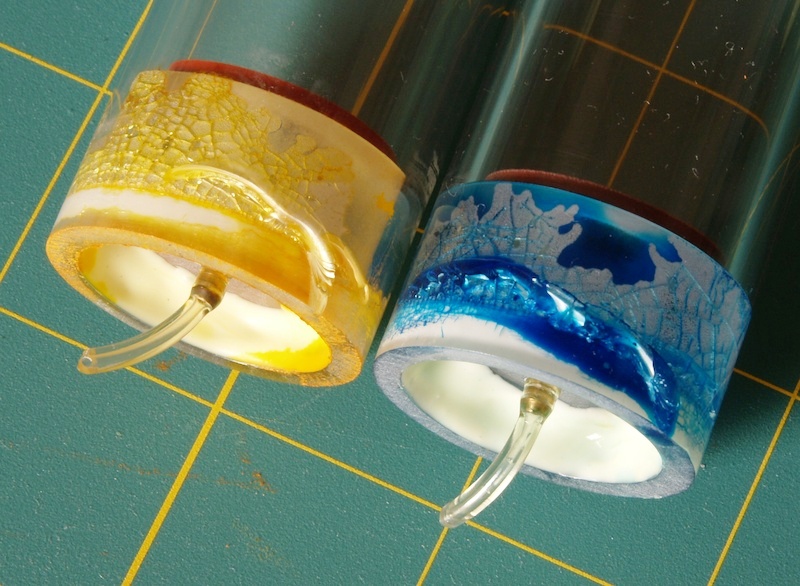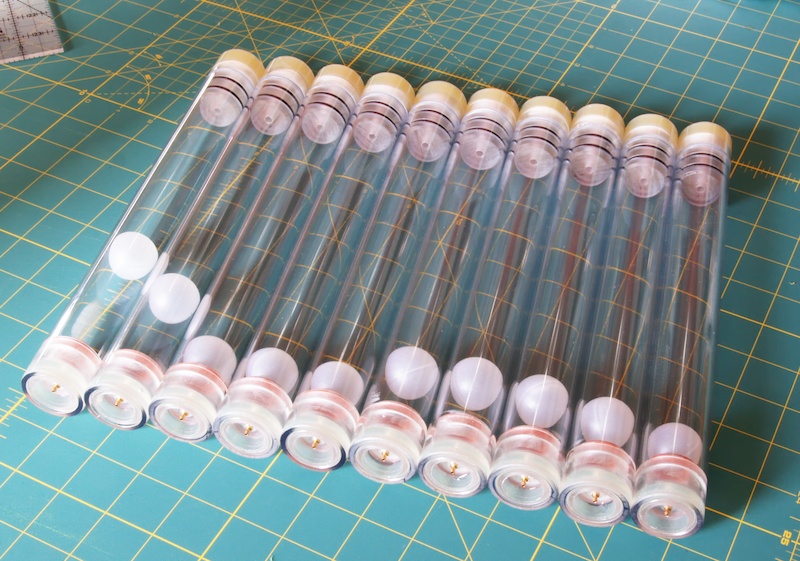Mod Note: Split this into a seperate thread so we can get all the "glues that work" posts in one place..
I recently bought some glue from MIS which they recommend for assembling their DIY CIS systems. It is Loctite Super Glue, and it says it is suitable for "All Plastics" and boasts "Advanced system for hard-to-bond materials". The data specifically mentions polyethylene and polypropylene. The product code is 01-82565 on the pack I purchased from the States, it may of course be different in UK.
The pack contains two tubes, one of "bonder", and a second of "activator", so it may be subtly different to your run-of-the-mill superglue, and the reverse of the packaging is full of dire warnings. Haven't tried using it yet though.
Loctite website calls it "Loctite® All Plastics" (http://www.loctiteproducts.com/glue.asp?PLID=661)

Knowledge Base • Links • Downloads • Gallery 2 • Calendar • Log in


|
Page 1 of 1 |
| Materials :: Glues | |
| Author | Message |
|---|---|
|
Peter_G Clued up 
Joined: 04 Jun 2006 Posts: 66 Location: Hertfordshire, UK |
|
| Mon Jun 19, 2006 9:04 pm | |
|
Martin Site Admin 
Joined: 30 Apr 2002 Posts: 4132 Location: South Yorkshire, UK |
Just returning to this topic... I've been playing with a few glues off and on and found a few things that helped.
- Epoxy resins are generally very brittle and as such not ideal for glueing fitting to cartridges where there's a lot of flexing. - It is possible to purchase flexible epoxy resins which tend to be more opaque but they are less brittle and I've actually started using this sort of glue exclusively. Probably one of the most useful nuggets I learned recently though related to fittings, specifically that certain materials can swell or expand through constant exposure to moisture (ie: ink). One material I was told to watch out for was Nylon which apparently does this. For obvious reasons you won't want to put this sort of fitting material into a cartridge with a brittle glue or made from brittle material otherwise it will probably stress and fracture them. _________________ Printers: (Canon) MP500/830, MX700, iP4000/4200/4300/4500/5200, iX4000(A3) (Epson) C84/86, D88, CX6600, R285/800/1900 (HP) K550, K850, K5400, L7680 |
| Fri Feb 22, 2008 3:51 pm | |
|
xiphmont Clued up 
Joined: 28 Mar 2009 Posts: 69 Location: Somerville, MA USA |
I have tried the PP and PE superglues and I believe I've used this glue as well though years ago. They bond PE and PP better than run of the mill cyanoacrylate (which is to say they stick at all) but it's still not a great bond and tends to fracture/peel over time especially if the surface prep wasn't perfect, especially if it's not a joint with alot of surface area. The real problem with cyanoacrylate glues is that they're water soluable. It takes a while (eg six months... a year...) but they all eventually dissolve in water as far as I know. I don't know if a tubing joint would dissolve fast enough to be a problem within a normal lifetime, do report back with your findings after a year or two! No sarcasm, I really want to know. I've had enough cyanoacrylate joints fail in my past from them getting rained on occasionally that I don't trust the stuff anymore anwhere where water is involved. Monty |
| Sat Mar 28, 2009 9:05 pm | |
|
Martin Site Admin 
Joined: 30 Apr 2002 Posts: 4132 Location: South Yorkshire, UK |
Hi Monty,
Thanks for your post... I hadn't realised some of that so it was useful intel... In the end I realised that I might be approaching the problem from completely the wrong angle so I went away and thought about it some more and realised what I really needed was a plastics thread lock type approach. I'm refining it slightly but the glue in question is quite tricky to get in Europe and I can't find the darned bottle at the moment.. Mindful of what you said though I've also been sealing around the joint with a hot glue gun to top it off. _________________ Printers: (Canon) MP500/830, MX700, iP4000/4200/4300/4500/5200, iX4000(A3) (Epson) C84/86, D88, CX6600, R285/800/1900 (HP) K550, K850, K5400, L7680 |
| Sun Mar 29, 2009 12:12 am | |
|
xiphmont Clued up 
Joined: 28 Mar 2009 Posts: 69 Location: Somerville, MA USA |
A few new glue updates from 'a year after'
We had discussed in another thread what the terrifying $70/oz BondIt B45TH epoxy could possibly offer that $5 white marine epoxy didn't... Well, we have an answer! After one year, the ink has destroyed all of the marine epoxy joints with which it was in direct contact (this has caused a number of leaks). Joints began failing after about eight months. Results were similarly disastrous for both pigment and dye inks. None of the direct-contact B45 joints are showing any problems as yet. Also, I had used IPS weld #40 to join polycarbonate pieces together in a several reserviors (weld #40 is the accepted 'correct' chemical weld for polycarb). Very surprisingly, many of these joints have crazed badly and several even cracked through completely. The failure rate is near 50% after one year.. This result is very surprising. My only guess is that the alcohol content of the ink is adding greatly to the internal stresses of the joints. The only crazing in any pieces has been where there was a chemical solvent weld. I'll be remaking several of the reservoir tubes using only B45 to join pieces to see how that goes. I'll give another update in another year :-) |
| Tue Jan 12, 2010 11:03 pm | |
|
Martin Site Admin 
Joined: 30 Apr 2002 Posts: 4132 Location: South Yorkshire, UK |
Hi Xiphont,
You've prompted me to update my own status on this topic as my own endeavours in this area really need redressing. The first off was the threadlocker approach... Waste of time, money and effort that one. Every single one failed within 6 to 8 weeks so obviously the inks are not compatible there. I obtained a glue which I've yet to use due to a lot of stuff (like a baby) which has taken my time... That's next on my test bench though and is basically a high spec' flexible epoxy.. which leads me nicely on to my success story... ... ie: the cheap flexible epoxy I got from an ebay seller... Whilst it's not perfect at dealing with physical flexing of the cartridge, if you look after it when creating the join, ensuring the surface is clean (alcohol swab it to be sure) and then leave it for double the normal full cure time I found it provides a very good bond. As with all things patience has been the key and never my strong point, if I'm honest... Anyway, as the cheap version works the best so far, I'm hopeful that the higher spec' stuff will provide an even better bond and resolve the remaining teething issues sufficiently. Of course this is all now somewhat academic as HP seem dedicated to killing off their Officejet line of inkjets with poorer and poorer quality printers, drivers and support. _________________ Printers: (Canon) MP500/830, MX700, iP4000/4200/4300/4500/5200, iX4000(A3) (Epson) C84/86, D88, CX6600, R285/800/1900 (HP) K550, K850, K5400, L7680 |
| Tue Jan 12, 2010 11:33 pm | |
|
xiphmont Clued up 
Joined: 28 Mar 2009 Posts: 69 Location: Somerville, MA USA |
What is the name? Tell all about it! How long has it been tested for? I'm sure there's *some* cheap adhesive out there that will work, perhaps this is it. The white marine epoxy looked like it was working perfectly for a pretty long time. Then the ink started eating past it. But it took months. I've made up new sets of tubes with B45. And I get to try out my new 'simplified' float system which seems to avoid the problems of the old one. And it's way easier to make. One unexpected discovery-- regular cheap aquarium silicone bonds polycarbonate well. It's not any more structural a bond than silicone ever is, but for a shear joint (and most of my reservior system is shear joints, including all the immersed joints) it is way stronger than will ever be needed; I wouldn't be able to take it apart with a hammer. And I'm completely certain silicone will stand up to anything in the ink forever. If the B45 joints turn out to fail after a year or two, the next round will be silicone. But I made up this batch before the silicone discovery :-( [edit: I also know for a fact that silicone will *not* bond PP or PE, so it's not useful for the cartridges, just for assembling my reservioirs which happen to be polycarb]
Ugh, ain't it the truth. There's a reason I'm using a 10 year old printer. |
| Fri Jan 15, 2010 10:39 pm | |
|
xiphmont Clued up 
Joined: 28 Mar 2009 Posts: 69 Location: Somerville, MA USA |
BTW, here's a pic of what the failures looked like in the old tubes after a year. It looks pretty grisly, but the leaks were slow enough that the ink just dried along the outside of the crack before it could go anywhere. It would have gotten much worse eventually though. So... chemically bonding polycarb is right out. I'll bet that's due to the alcohol content of the ink combined with the surface stresses caused by the chemical bond. You can see the marine epoxy was being undermined too.

Here's the first batch of the new generation made with B45 before going into service!  |
| Sun Jan 31, 2010 3:29 pm | |
|
Martin Site Admin 
Joined: 30 Apr 2002 Posts: 4132 Location: South Yorkshire, UK |
Completely forgot to update with the eBay store so apologies for that...
The original listing I purchased is now dead but this should be the same stuff. Worth noting that I also worked with this flexible super glue this but not only was it not really very effective, I also suffered a severe allergic reaction that has triggered a bunch of other allergies since so be warned. _________________ Printers: (Canon) MP500/830, MX700, iP4000/4200/4300/4500/5200, iX4000(A3) (Epson) C84/86, D88, CX6600, R285/800/1900 (HP) K550, K850, K5400, L7680 |
| Thu Feb 04, 2010 2:39 am | |


|
Page 1 of 1 |
| You cannot post new topics in this forum You cannot reply to topics in this forum You cannot edit your posts in this forum You cannot delete your posts in this forum You cannot vote in polls in this forum |
|
85216 Attacks blocked
Design by phpBBStyles.com | Styles Database